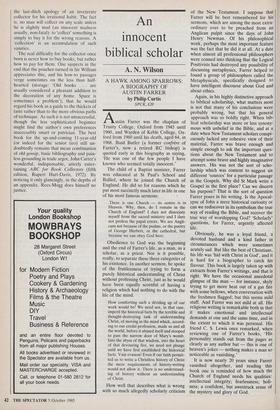An innocent biblical scholar
A. N. Wilson
A HAWK AMONG SPARROWS: A BIOGRAPHY OF AUSTIN FARRER by Philip Curtis
SPCK, f20
Austin Farrer was the chaplain of Trinity College, Oxford from 1945 until 1960, and Warden of Keble College, Ox- ford from 1960 until his death, aged 64, in 1968. Basil Butler (a former confrere of Farrer's, now a retired RC bishop) is quoted early in this biography as saying, `He was one of the few people I have known who seemed totally innocent.'
The child of a Baptist minister, Farrer was educated at St Paul's School and Balliol, where he joined the Church of England. He did so for reasons which he put most succinctly much later in life in one of his most famous sermons:
There is one Church — its centre is in Heaven. Why, then, do I remain in the Church of England? I dare not dissociate myself from the sacred ministry and I dare not profess the papal errors. We are Angli- cans not because of the psalms, or the poetry of George Herbert, or the cathedral, but because we can obey God here.
Obedience to God was the beginning and the end of Farrer's life, as a man, as a scholar, as a priest. Nor is it possible, really, to separate these three categories of his existence. In another sermon, he spoke of the fruitlessness of trying to form a purely historical understanding of Christ without professing Christ, just as he would have been equally scornful of having a religion which had nothing to do with the life of the mind.
How comforting such a dividing up of our work would be! We need not, in that case, imperil the historical facts by the terrible and thought-destroying task of understanding Christ, of moving in the mind which, accord- ing to our credal profession, made us and all the world, before it abased itself and stooped to pass the narrow door of Mary's womb. Into the abyss of that wisdom, into the heart of that devouring fire, we need not plunge until we have first established the historical facts. Vain evasion! Even if our faith permit- ted us to write a Christless history of Christ the mere requirements of history-writing would not allow it. There is no understand- ing of history without an understanding of Christ.
How well that describes what is wrong with so much allegedly scholarly criticism
of the New Testament. I suppose that Farrer will be best remembered for his sermons, which are among the most extra- ordinary ever to be preached from an Anglican pulpit since the days of John Henry Newman. Of his philosophical work, perhaps the most important feature was the fact that he did it at all. At a date when almost all professional philosophers were conned into thinking that the Logical Positivists had destroyed any possibility of discussing metaphysics, Farrer helped to found a group of philosophers called the Metaphysicals, specifically designed to have intelligent discourse about God and about ethics.
Again, in his highly distinctive approach to biblical scholarship, what matters most is not that many of his conclusions were probably wrong, but that his general approach was so boldly right. When bib- lical scholarship was more or less synony- mous with unbelief in the Bible, and at a date when New Testament scholars conspi- cuously lacked any cohesive view of their material, Farrer was brave enough and simple enough to ask the important ques- tions about the New Testament and to attempt some brave and highly imaginative answers. His was not the sort of scho- larship which was content to suggest six different 'sources' for a particular passage in the Gospels. Why did St Mark write a Gospel in the first place? Can we discern his purpose? That is the sort of question Farrer poses in his writing. Is the Apocal- ypse of John a mere historical curiosity or can we rediscover in its symbolism the true way of reading the Bible, and recover the true way of worshipping God? 'Scholarly' questions, for Farrer, urgently affected life.
Obviously, he was a loyal friend, a devoted husband and a kind father in circumstances which were sometimes acutely sad. But like the best of Christians, his life was 'hid with Christ in God', and it is hard for a biographer to catch his flavour. This book is largely taken up with extracts from Farrer's writings, and that is right. We have the occasional anecdotal glimpse of the man — for instance, shyly trying to get more heat out of a gas fire with some bellows, when conversation with the freshmen flagged; but this seems mild stuff. And Farrer was not mild at all. His religious writing is remarkable both in that it makes emotional and intellectual demands at one and the same time, and in the extent to which it was personal. His friend C. S. Lewis once remarked, when reviewing one of Farrer's books, 'His personality stands out from the pages as clearly as any author but — this is one of heaven's jokes — nothing makes a man so noticeable as vanishing.'
It is now nearly 20 years since Farrer vanished altogether, and reading this book one is reminded of how much the Church of England needs his qualities: intellectual integrity; fearlessness; holi- ness; a confident, but awestruck sense of the mystery and glory of God.


























































 Previous page
Previous page